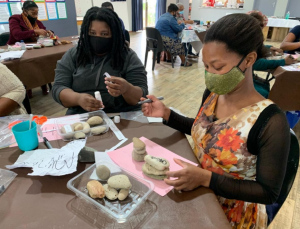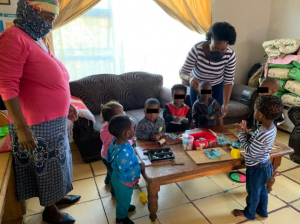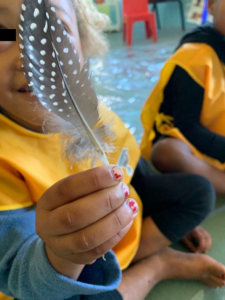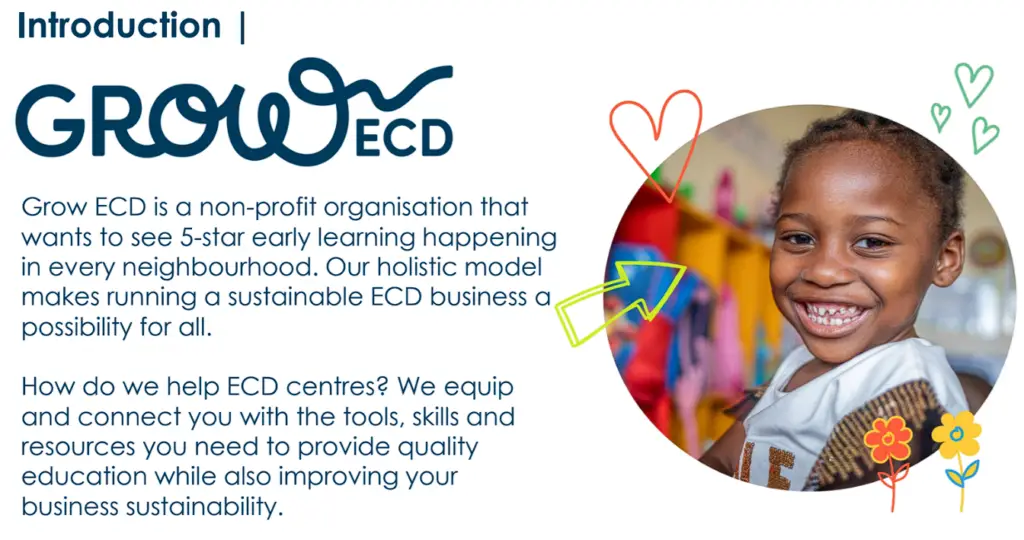The first 2021 field trip for the Kouga Windfarm Trust ECD project in the Eastern Cape took place in March (the trip was delayed on account of COVID infections). The field trip comprised four workshops and support visits to 15 ECD centres as follows:

Modelling the learning activities at each ECD centre was most rewarding and insightful for the ECD staff and the Africa A+ team (the two facilitators and Carole Scott founder of Izinto Africa). The ECD staff gained ideas on how to facilitate the children’s learning by using the arts in playful but purposeful ways. The Africa A+ team gained a deeper understanding of each ECD centre’s context. Although all are clean and tidy, 13 of the ECD centres have meagre resources and facilities e.g. no play equipment, poor ventilation and inadequate sanitation facilities.
The modelling demonstrated playful learning activities that teachers can do to develop their children’s creative, problem-solving and critical thinking skills. The Africa A+ team use recyclables and everyday objects as teaching materials so that every ECD centre, no matter their context, is able to facilitate quality learning activities.
Workshops 1 and 2 enabled an understanding of what is quality in terms of facilitating early learning. Each participant received a copy of the 0 – 4 years National Curriculum (NCF) Framework and links were made between play activities and the NCF aims. Workshop 3 saw the Kouga facilitators being creative with ‘loose parts’ (recyclables and everyday materials) and understanding why we need to nurture children’s creativity, problem solving and critical thinking skills. Workshop 4 helped the principals, lead teachers, and the Kouga facilitators to reflect on being an effective ECD leader and inspired them to think out of the box in playful and creative ways.
The reason for facilitating the same workshop on ‘Understanding quality learning?” on two afternoons pertains to Africa A+’s whole school approach i.e. everyone at the ECD centre is involved and on board. Facilitating the same workshop on different days enables half the staff to come on one day and the other half to come on the following day (because somebody always has to stay behind to look after the children).
All the workshops were experiential and engage with the arts. If we are expecting ECD centres to nurture children’s creativity then we must make sure that the ECD principals and teachers are in touch with and enjoying their own creativity.
Some comments written by the Kouga facilitators and 15 ECD centre principals and staff (in their own words) in response to the following reflection questions:
-
- What inspired you today?
- That u can be very creative in your own way as a teacher.
-
- The different manners in wich quality education can change a childs life.
- Learning children how to think for themselves.
- What did you learn today?
-
- Not to do activities for the children. The children must use their own creativity and imagination.
- To be more creative. To challenge my learners.
- To do something out of your mindset/out of the box. Help to learn your children in your ECD about being creative and problem solving.
- How powerfull the mind or imagination can be. To never stop learning.
- What are you going to change or do differently?
- Ask more questions and give them [the children] the opportunity to answer and get more involved. Practice problem solving.
- To do more creative activities with the kids. So they can freely express and explore the different material.
- Let the children be creative and not just give them a worksheet to colour in.






